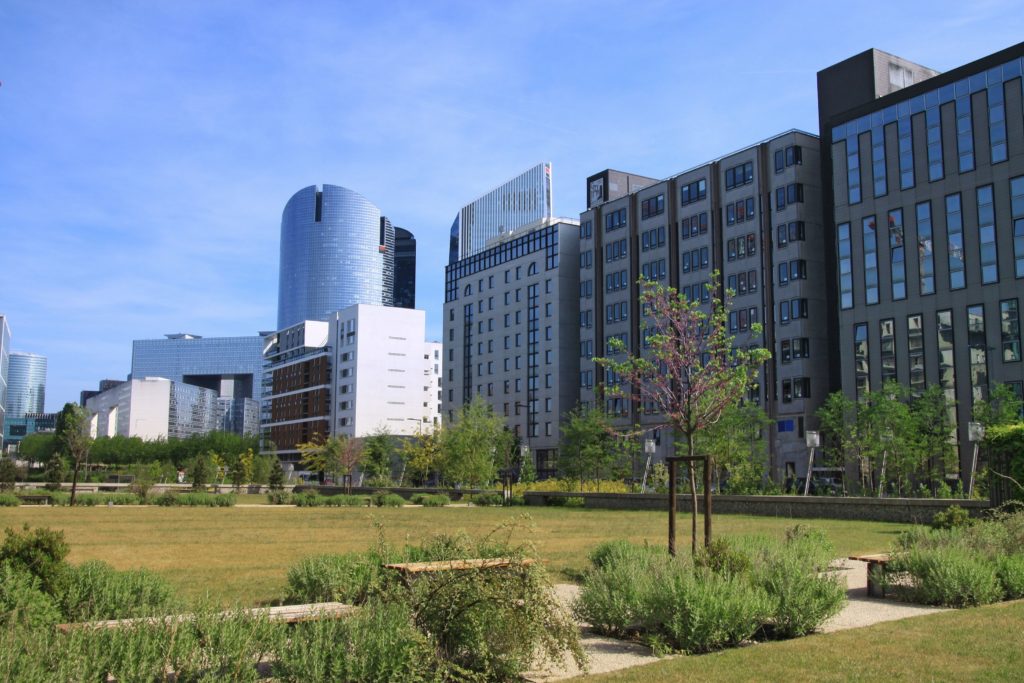The CSR commitment of business parks? Since the NOTRe law (law on the new territorial organization of the French republic) in 2015, the inter-municipalities have taken over the authority on business parks, facing many challenges to revive these areas and make them a vector of attractiveness for territorial economic development. Moreover, in a context of reindustrialization and sovereignty of the territories, with 100 Md € planned by the plan “France Relance” (France’s investment plan for 2030) between 2020 and 2022 for example, the business parks offer a certain potential for the relocation of companies. To address these concerns, we propose to explore the extent to which Corporate Social Responsibility (CSR) is a key factor in the renewal of business parks in France.
The business park dilemma for communities
Booming since the 1950s, business parks have long been a symbol of modernity and attractiveness for territories. France has about 32,000 business parks, covering approximately 450,000 hectares. However, the initial enthusiasm has faded over time: aging buildings, under-occupied premises, feelings of insecurity, poor connection to computer networks, lack of services offered to employees… business parks no longer have as good a reputation as they once did.
The CSR commitment of business parks: a new driver to boost their attractiveness and make them a vector for territorial economic development
The need to integrate sustainable development concerns in public or private organizations is no longer in question. The application of the concept of sustainable development to business parks translates into CSR (Corporate Social Responsibility) measures that allow for coherent development of the territory, preserving the landscape and improving the local quality of life.
Beyond these direct societal, environmental, and economic benefits, implementing a CSR approach on the scale of business parks allows inter-municipalities to:
- Take stock of the existing situation, by taking a step back from isolated actions implemented for several years by established companies, but also from programs deployed on the scale of an EPCI (public establishment of inter-municipality cooperation) for the digital transition, energy, training, etc.
- Identify areas for progress to develop new assets.
- Strengthen partnerships by opening to other actors in the territory on issues of recycling, inclusion of people with disabilities, access to culture, etc.
- Enhance their commitment to their territorial marketing strategy, to attract new local and even international prospects.
- Seize the opportunity to innovate on the issue of the necessary requalification of business parks, by (re)connecting them to urban centers.
The 3 pillars of a business park CSR strategy
The classic methodology for structuring a CSR strategy is to apply the international standard ISO 26000, which proposes seven guidelines for implementing corporate social responsibility. For business parks, there are various stakeholders: developers, concessionaires, managers, business leaders, business associations, employees, and users. We can therefore imagine three main pillars of a CSR strategy, to be adapted according to local specificities and types of business parks.
First CSR pillar: the quality of the work environment
The quality of the development of business parks includes the presence of urban furniture, sports facilities, company concierge services and the organization of cultural events. Indeed, these elements contribute greatly to the well-being and fulfillment of employees, repositioning business parks as new city districts.
The evaluation of the level of satisfaction of the employees of the companies present on business parks and of their needs should allow them to be regularly upgraded. Conversely, the perceived quality of the services offered at the level of a business park becomes a criterion of choice for the establishment of companies.
In addition to development, the ability to pool certain services, such as a catalog of continuing education programs, and even to create synergies between players, contributes significantly to the development of employees’ skills. Ultimately, the expertise developed within the business parks contributes to the influence of the region.
Second CSR pillar: environmental excellence
Because of the growing competition between residential, agricultural, and economic spaces, with the full range of activity zones (crafts, commercial, industrial, mixed use, etc.), the balance for the best use of space is not simple.
However, it is possible to optimize a business park from the moment it is developed: no artificialization in land use, control of nuisances, quality of landscape integration, preservation of biodiversity, compensation for soil artificialization, management of water and air quality, use of bio-sourced or even reused materials, or production of renewable energy for self-consumption, are all axes of the sustainable development of business parks. Some business park developers even go as far as to impose constraints on tenants through the CPAUPE (specifications and architectural, urban, landscape and environmental recommendations), to guarantee the limitation of the zone’s impact in the long term.
Is it too late for existing zones? On average, one-third of the GHG emissions of a business park comes from the companies installed during the park’s operation phase [1]. Sharing best practices between existing companies can accelerate the implementation of individual or even collective actions to reduce the impact of business parks and their companies, such as a carpooling solution for example.
Third CSR pillar: the integration of the business park in its territory
Business parks committed to a CSR approach are certainly drivers of coherent economic development. Indeed, the innovation that results from a CSR approach allows business parks to position themselves as examples for territories, on issues such as social and solidarity economy, new mobilities, or even territorial industrial ecology. Business parks are regaining a significant place by playing their role in linking sectors and bringing together complementary players. From these synergies emerge new virtuous collaborative projects, vectors of added value in the territories.
The business parks are also able to develop employment promotion actions to overcome recruitment problems of certain territories or sectors of activity.
Finally, the management of business parks, a skill that is often put aside or whose governance is often not defined, is taking on a significant role in a CSR strategy to the point of becoming the key factor of success.
Know more about our experience in the field of CSR strategy >
Going even further with a regional label for business parks committed to a CSR approach
During the “Grenelle de l’environnement” Forum in 2007, the working group led by the Orée association to “promote ecological development methods favorable to competitiveness and employment” noted that only 0.5% of business parks participated in progress and sustainable management.
Since then, several initiatives have emerged in France to recognize business parks committed to a CSR strategy. This is the case, for example, with the PARC+ label in the PACA region, which has since 2018 been awarded to more than twenty exemplary business parks. The Normandy Region launched on December 16th, 2021, its label “Normandie ReSponsablE” whose objective is to promote the business parks committed in an ambitious CSR approach, an initiative to which Alcimed had the pleasure to contribute.
These regional strategic positions demonstrate the shift that has taken place to try to position the ecological transition at the heart of the economic development of the territories. They support an orientation towards the eco-conditionality of aid and public contracts. A CSR strategy is now an essential element for the business parks of tomorrow. And Alcimed is here to accompany you to explore this uncharted territory.
About the author,
Raphaëlle, Consultant in Alcimed’s Innovation & Public Policy team in France
[1] Les impacts des zones d’activités, Guillaume Gacon, ECO2 Initiative, 29 septembre 2020



